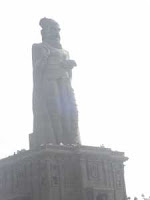NLP Through Thirukural 1
REPRESENTATIONAL
SYSTEM
SYSTEM
KuraL
சுவையொளி ஊறோசை நாற்றமென் றைந்தின்
வகைதெரிவான் கட்டே உலகு ( 3 :
27)
வகைதெரிவான் கட்டே உலகு ( 3 :
27)
Transliteration:
Suvaioli Ooruosai Naatramendru Aindhin
Vakaidherivaan Katte Ulaku
Suvaioli Ooruosai Naatramendru Aindhin
Vakaidherivaan Katte Ulaku
Meaning
They gain
the world who grasp & tell
Of taste, sight hearing touch & smell
the world who grasp & tell
Of taste, sight hearing touch & smell
Explanation
ThiruvaLLuvar,
the author of ThirukkuraL, is clear in stating the role of 5 senses in gaining
knowledge from the world manifest and mastery over worldly affairs.
ThiruvaLLuvar says ‘he will command the world who appreciates the true value of
5 senses namely seeing hearing feeling smelling & tasting.
the author of ThirukkuraL, is clear in stating the role of 5 senses in gaining
knowledge from the world manifest and mastery over worldly affairs.
ThiruvaLLuvar says ‘he will command the world who appreciates the true value of
5 senses namely seeing hearing feeling smelling & tasting.
This
commandment of ThiruvaLLuvar is reflected by NLP.
commandment of ThiruvaLLuvar is reflected by NLP.
Coming to NLP
REPRESENTATIONAL SYSTEM
NLP says
we do not experience the world directly, rather it happens through our
senses.
Our senses are the doorways of our perception.
Senses are the modes with which we cognize the world.
All we know of the world we know through our senses.
Senses represent the world to us & so 5 senses are called REPRESENTATIONAL
SYSTEM
we do not experience the world directly, rather it happens through our
senses.
Our senses are the doorways of our perception.
Senses are the modes with which we cognize the world.
All we know of the world we know through our senses.
Senses represent the world to us & so 5 senses are called REPRESENTATIONAL
SYSTEM
We have
five main sensory modalities.
Our inner subjective experience is structured in terms of these senses.
When we think, or process information internally, we “re-present” the
information in terms of the sensory systems – our representational
systems.
They are our only contact with the “outside world. In NLP we refer to these as the main
modalities.
five main sensory modalities.
Our inner subjective experience is structured in terms of these senses.
When we think, or process information internally, we “re-present” the
information in terms of the sensory systems – our representational
systems.
They are our only contact with the “outside world. In NLP we refer to these as the main
modalities.
V –
Visual- seeing; A – Auditory- hearing; K – Kinesthetic- feeling; O – Olfactory-
smelling; G – Gustatory- tasting
Visual- seeing; A – Auditory- hearing; K – Kinesthetic- feeling; O – Olfactory-
smelling; G – Gustatory- tasting
To the
extent our senses are sharp the information received will be rich & matured
to well process for manipulation.
extent our senses are sharp the information received will be rich & matured
to well process for manipulation.
Sensory
acuity is important for mastery of NLP skills
acuity is important for mastery of NLP skills
Thus we
can easily agree that NLP & ThirukkuraL emphasize on the same point
can easily agree that NLP & ThirukkuraL emphasize on the same point

